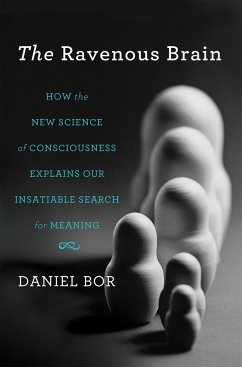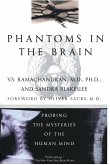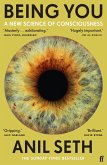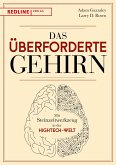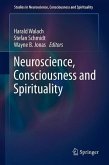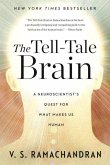A brash young neuroscientist presents his solution to biology's hardest problem-what consciousness is, and why we have it, and what it means for our self perception and our mental health
Consciousness is our gateway to experience: it enables us to recognize Van Gogh's starry skies, be enraptured by Beethoven's Fifth, and stand in awe of a snowcapped mountain. Yet consciousness is subjective, personal, and famously difficult to examine: philosophers have for centuries declared this mental entity so mysterious as to be impenetrable to science. In The Ravenous Brain , neuroscientist Daniel Bor departs sharply from this historical view, and builds on the latest research to propose a new model for how consciousness works. Bor argues that this brain-based faculty evolved as an accelerated knowledge gathering tool. Consciousness is effectively an idea factory- that choice mental space dedicated to innovation, a key component of which is the discovery of deep structures within the contents of our awareness. This model explains our brains' ravenous appetite for information- and in particular, its constant search for patterns. Why, for instance, after all our physical needs have been met, do we recreationally solve crossword or Sudoku puzzles? Such behaviour may appear biologically wasteful, but, according to Bor, this search for structure can yield immense evolutionary benefits- it led our ancestors to discover fire and farming, pushed modern society to forge ahead in science and technology, and guides each one of us to understand and control the world around us. But the sheer innovative power of human consciousness carries with it the heavy cost of mental fragility. Bor discusses the medical implications of his theory of consciousness, and what it means for the origins and treatment of psychiatric ailments, including attention-deficit disorder, schizophrenia, manic depression, and autism. All mental illnesses, he argues, can be reformulated as disorders of consciousness- a perspective that opens up new avenues of treatment for alleviating mental suffering. A controversial view of consciousness, The Ravenous Brain links cognition to creativity in an ingenious solution to one of science's biggest mysteries.
Hinweis: Dieser Artikel kann nur an eine deutsche Lieferadresse ausgeliefert werden.
Consciousness is our gateway to experience: it enables us to recognize Van Gogh's starry skies, be enraptured by Beethoven's Fifth, and stand in awe of a snowcapped mountain. Yet consciousness is subjective, personal, and famously difficult to examine: philosophers have for centuries declared this mental entity so mysterious as to be impenetrable to science. In The Ravenous Brain , neuroscientist Daniel Bor departs sharply from this historical view, and builds on the latest research to propose a new model for how consciousness works. Bor argues that this brain-based faculty evolved as an accelerated knowledge gathering tool. Consciousness is effectively an idea factory- that choice mental space dedicated to innovation, a key component of which is the discovery of deep structures within the contents of our awareness. This model explains our brains' ravenous appetite for information- and in particular, its constant search for patterns. Why, for instance, after all our physical needs have been met, do we recreationally solve crossword or Sudoku puzzles? Such behaviour may appear biologically wasteful, but, according to Bor, this search for structure can yield immense evolutionary benefits- it led our ancestors to discover fire and farming, pushed modern society to forge ahead in science and technology, and guides each one of us to understand and control the world around us. But the sheer innovative power of human consciousness carries with it the heavy cost of mental fragility. Bor discusses the medical implications of his theory of consciousness, and what it means for the origins and treatment of psychiatric ailments, including attention-deficit disorder, schizophrenia, manic depression, and autism. All mental illnesses, he argues, can be reformulated as disorders of consciousness- a perspective that opens up new avenues of treatment for alleviating mental suffering. A controversial view of consciousness, The Ravenous Brain links cognition to creativity in an ingenious solution to one of science's biggest mysteries.
Hinweis: Dieser Artikel kann nur an eine deutsche Lieferadresse ausgeliefert werden.
Simon Baron-Cohen, Professor of Developmental Psychopathology, University of Cambridge, and author of The Science of Evil
Daniel Bor takes on the most challenging of topics, the nature of conscious experience, bringing to bear his unique combination of personal motivation (from having witnessed the psychologically disabling effects of his father's stroke), his deep knowledge of philosophy, and his everyday experience as a cognitive neuroscientist. In so doing, he brings consciousness down to earth, taking it apart to make it scientifically tractable. He has provided a valuable service to those in the separate fields of philosophy and neuroscience by his highly readable integration of these fields."
Chris Frith, Emeritus Professor of Neuropsychology, Wellcome Centre for Neuroimaging, University College London, and author of Making up the Mind
Reading books about the science of consciousness I am often left with the feeling that our mental life is some kind of unnecessary froth that arises by magic. This book is refreshingly different. Here, at last, consciousness is seen in the light of evolution and is treated as something that is intensely practical and useful."
Daniel Bor takes on the most challenging of topics, the nature of conscious experience, bringing to bear his unique combination of personal motivation (from having witnessed the psychologically disabling effects of his father's stroke), his deep knowledge of philosophy, and his everyday experience as a cognitive neuroscientist. In so doing, he brings consciousness down to earth, taking it apart to make it scientifically tractable. He has provided a valuable service to those in the separate fields of philosophy and neuroscience by his highly readable integration of these fields."
Chris Frith, Emeritus Professor of Neuropsychology, Wellcome Centre for Neuroimaging, University College London, and author of Making up the Mind
Reading books about the science of consciousness I am often left with the feeling that our mental life is some kind of unnecessary froth that arises by magic. This book is refreshingly different. Here, at last, consciousness is seen in the light of evolution and is treated as something that is intensely practical and useful."

